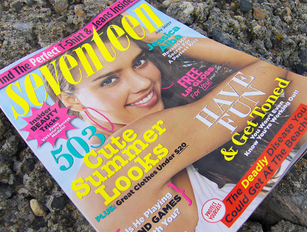
Publications, online and print, survive on ad revenue. Seventeen can afford to disregard their readership (it’s worth noting that one look at the petition’s comments reveals a lot of women beyond Seventeen’s demographic signed) because it’s not actually where the main profits come from. The deal is all the clothes, make up and products featured in the content of the magazine looks good. That includes the image of a bottle of spot cream which will also have benefitted from a little digital nip and tuck.
A call for a ban on Photoshop is perhaps both too simple and too big a task. Retouching, airbrushing and Photoshop have been continuing since photography was invented. Before that anybody, outside Oliver Cromwell, had portraits that focused on their better features and no artist endeavoured to include every pore. To say we as consumers are unaware of a little stretching of the truth is untrue. However the fact is as consumers we are also aware that a model scout is not going to leap out at us anytime soon and demand we sashay to the nearest model agency immediately.
Of course advertising needs to change, and frequently does, else we’d all still be Lysolling our vaginas instead of sluicing the kitchen floor with it. The readdressing of Lysol’s purpose was not because women were falling under the impression their vaginas were abnormal because they weren’t linoleum lined. It was because it’s probably unwise to flush yourself out with anything proven to be “highly toxic to aquatic invertebrates” plus Lysolled vaginas were probably starting to feel a little Lino-like. It is the classic advertisement formula of identifying a new problem (usually for women) then, luckily for us, providing a solution that needs to be modified.
On Friday The Daily Mail’s Liz Jones was prompted by recovering anorexic Rachael Johnston’s UK based e-petition to “Ban airbrushing of all images and adverts aimed at children in the UK” to declare that she and Johnston were “proof that glossy magazines can give you anorexia”. Jones might as well have gone the full Daily Mail and told us Photoshop causes cancer.
Are we, young or old, that impressionable? The answer is of course not. Anorexia is not an illness of vanity; it is an illness, as is bulimia and any other eating disorder. It is highly reductive to insist such an extreme pattern of self-punishment is triggered only by images in magazines and advertising. It rather suggests the women and men who seek treatment for eating disorders will be subjected to slowly spoken presentations explaining Photoshop and aspiration media.
It is great to see young women such as Johnston and Bluhm take action. Let’s be optimistic and take it as a sign something is being done right if young people feel able to take a stand. Bluhm has not been disheartened by Seventeen’s polite rejection of her huge achievement, saying: "While I would still change some of the ways Seventeen portrays girls, I'm encouraged that they're willing to listen to me and the 30,000 people who've signed my petition. Seventeen's invited me to work with them on this issue".
It is not just teenage girls who live their lives as some kind of compare and contrast essay. Everyone seems to, we compare our age and achievements with others, our looks with celebrities and base our worth on how much or little reality TV we watch. I don’t think the problem begins and ends with Photoshop.
Yes, with regards to Photoshop in magazines a call for less of the wrist sized waists and giraffe necks might be in order. But the rather insulting nature the only counter campaign to this aesthetic of Real Women Have Curves is just as restrictive. Yes fashion and magazines need to widen their aesthetic to include other sizes, ethnic background and even age. But commentary needs to change with the images.
For Bluhm’s generation it’s a question of how they employ this awareness they have that magazines use doctored images. We’ve noted the naked Emperor isn’t so slim himself, now we need to decide if we’re going to chuck a raincoat over him or fling our own cover ups to the side and call for diversity. With the internet we all have the tools to not just tell publications what we want with petitions and letters. We can show them what we want. We can, as it were, provide for ourselves.
Teenage sex advice site Scarleteen and Tavi Gevinson’s teen girl site Rookie are showing us that teenagers such as Bluhm should not allow themselves to be dismissed so easily by Seventeen et al. But the Liz Joneses and Jo Swinsons of this world need to refine their argument to help Bluhm’s and Johnston’s vision happen.
Squeamish Kate
 RSS Feed
RSS Feed
